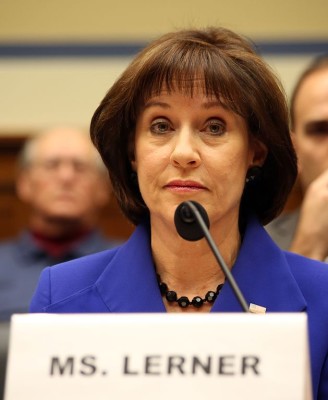E-mails between the Wisconsin Government Accountability Board’s Kevin Kennedy and state and federal officials show Wisconsin’s top campaign finance watchdog corresponding with opponents of free speech in campaigns. Among those Kennedy communicated with via his government e-mail address include the IRS’s Lois Lerner, the former head of Connecticut’s campaign finance regulatory agency, and a former FEC official who used to be Lerner’s boss.
 Kennedy, who led his agency into the center of a secretive John Doe investigation that presumed guilt (without evidence) on the part of Republican politicos and conservative non-profit groups, exchanged e-mails in 2010 with Lawrence M. Noble and Jeffery A. Garfield. Also included on the e-mails was Lois Lerner, the IRS official who used the power of that agency to wage war on conservative organizations.
Kennedy, who led his agency into the center of a secretive John Doe investigation that presumed guilt (without evidence) on the part of Republican politicos and conservative non-profit groups, exchanged e-mails in 2010 with Lawrence M. Noble and Jeffery A. Garfield. Also included on the e-mails was Lois Lerner, the IRS official who used the power of that agency to wage war on conservative organizations.
Kennedy’s relationship with Lerner has been previously exposed, but his relationship with Noble and Garfield has not been explored.
From 1987 to 2000, Noble was general counsel for the Federal Election Commission. Since leaving that job he has held a number of positions at leftwing groups that advocate for strict limits on campaign fundraising. In 2012, he was named president and CEO of Americans for Campaign Reform, a group that calls itself an, “advocate for public funding of federal elections.” Nobel was quoted by Bloomberg Business at the time saying, “I passionately believe there is a need for a fundamental change in how we finance elections and public funding has to be the foundation of that change.”
Katie Pavlich, writing for Townhall.com in 2014, wrote about a 2010 e-mail from Lerner to IRS employees in which the now-disgraced official mentioned that Noble was her former boss. “As I mentioned yesterday — there are several groups of folks from the FEC world that are pushing tax fraud prosecution for [501]c4s,” Lerner explained in an e-mail encouraging fellow IRS employees to get in on the action. “One is my ex-boss Larry Noble (former General Counsel at the FEC),” wrote Lerner, “who is now president of Americans for Campaign Reform. This is their latest push to shut these down.”
The groups Lerner and Noble were targeting were conservative.
In 2012, Noble lamented to The Washington Times that his old agency – the FEC – wasn’t able to threaten campaigns as effectively as it used to do. “At one time when the FEC was actually taking people to court, it was actually a threat. If it’s not going to litigate these cases you lose a lot of leverage,” Noble told the paper. The FEC’s reluctance – or inability – to successfully collect all fines assessed on campaigns, “sends a signal that this is not a regulatory agency that has to be feared,” he claimed.
Clearly, Noble believes campaign regulators are to be feared – a position in line with Kennedy’s actions in Wisconsin. The GAB used a secret black budget to help law enforcement carry out an investigation that involved pre-dawn raids on the homes of political operatives investigators hoped were breaking the law.
In written testimony solicited by Sen. Amy Klobuchar (D-MN) for the U.S. Senate Judiciary Committee, Noble claimed in 2013 that, “The current state of our campaign finance system is undermining the public’s trust in our government.” He also advocated for a new set of federal-level regulations that would, if promulgated, validate Kennedy’s theory of illegal political coordination – something state and federal courts have dismissed as anti-First Amendment – that led to the 2013 John Doe probe of conservatives in Wisconsin.
In late 2014, the former federal regulator railed in a Huffington Post column against a year-end omnibus spending bill passed by Congress, claiming new campaign finance regulations would further corrupt politics by allowing wealthy donors to give more money to political parties.
Jeffery A. Garfield, Kennedy’s other virtual pen pal, was once the Executive Director of Connecticut’s State Elections Enforcement Commission, a post similar to Kennedy’s current job in Wisconsin. In that job, Garfield regularly pushed for public finance of political campaigns and increased regulations on who can, and how much can be given by private citizens to candidates running for office.
In 1996, Garfield urged elected officials in Connecticut to adopt voluntary campaign spending limits. The following year he asked lawmakers to give his agency the power to impose increased fines on donors who give above the campaign contribution limits.
In 2005, Garfield mourned the collapse of a public financing for elections scheme that the legislature initially killed. “We were so close,” he told the media.
After Garfield left government employment, he went to work in 2012 for – of all things – a SuperPAC working on behalf of then-Democratic Senate candidate Chris Murphy, an incumbent Congressman at the time. Murphy is now a U.S. Senator.
“Jeff Garfield, the former executive director and general counsel of the state Elections Enforcement Commission, is the assistant treasurer and Connecticut counsel [of Connecticut’s Future PAC],” reported the New Haven Register. He made $10,736 from the SuperPAC according to OpenSecrets.org.
Garfield, in 2008, nominated his friend Kennedy for an international award recognizing his work monitoring campaigns in Wisconsin.
Wisconsin lawmakers are considering legislation that would dramatically reform the GAB and require Kennedy to be more accountable for his actions at the agency.
Note: In the e-mails linked below, Jeffery Garfield is the user of “mrprez98@aol.com” and Lawrence Noble is the user of “lnoble@skadden.com.”
Kennedy E-mails: Kennedy-Lerner-Lawrence-Noble-emails
Noble U.S. Senate Testimony: NobleUSSenJudiciaryCommittee
Authored by Brian Sikma.
Leave a Comment
COMMENTS POLICY: We have no tolerance for messages of violence, racism, vulgarity, obscenity or other such discourteous behavior. Thank you for contributing to a respectful and useful online dialogue.